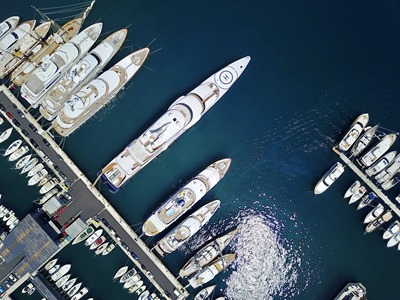Companies to introduce PYURE air and surface sanitizing hydroxyl technology to Yachts
 FORT LAUDERDALE (August 26, 2020) - MHG Insurance Brokers, the marine industry’s crew benefits specialist, and VIKAND SOLUTIONS, LLC, a global, maritime medical operations and healthcare solutions provider, announced their partnership to bring VIKAND’s Health and Hygiene program to the yachting industry. This Health and Hygiene program consists of a 3-pronged approach to reduce and potentially eliminate the threat of COVID-19 onboard, while also promoting the overall health and wellness of crew and guests through air purification technology, medical protocols, and around the clock medical support. VIKAND’s strategy includes:
FORT LAUDERDALE (August 26, 2020) - MHG Insurance Brokers, the marine industry’s crew benefits specialist, and VIKAND SOLUTIONS, LLC, a global, maritime medical operations and healthcare solutions provider, announced their partnership to bring VIKAND’s Health and Hygiene program to the yachting industry. This Health and Hygiene program consists of a 3-pronged approach to reduce and potentially eliminate the threat of COVID-19 onboard, while also promoting the overall health and wellness of crew and guests through air purification technology, medical protocols, and around the clock medical support. VIKAND’s strategy includes:
· Technologies like PYURE are used to suppress COVID-19 and other contaminants which can stay in the air in aerosolized droplets and on surfaces for hours
o PYURE works to actively distribute disinfecting air to kill viruses, bacteria, mold, etc.
o The technology is proven to be effective, safe, green, and energy saving.
o PYURE can create an environment of ultra-clean, crisp air.
· Health & Hygiene Protocols with COVID-19 focus from VIKAND’s Public Health Practice
o Public Health Service support in the installation and management of protocols.
o Advice, education, support, and solutions for preemptive testing and tracking.
· COVID-19 Hotline 24/7 Medical Support by VIKAND’s expert maritime medical staff
o House calls – VIKAND’S medical team reaches out to each vessel monthly.
o Mental wellness support.
“We are delighted to be partnering with MHG,” said Peter Hult, VIKAND CEO. “COVID-19 is on everyone’s mind at the moment and we’re happy to bring the industry a potential solution which helps promote a high degree of health and wellness on board.”
Through this collaborative effort, MHG and VIKAND strive to provide clients and the yacht industry with a cohesive strategy to help mitigate the risk of infection and transfer on board, while providing guests and crew outstanding care, comfort, and support.
“As owners return to their yachts and charters resume, we want to make sure our clients and the industry have access to as many tools as possible to combat COVID-19,” said Andrew Dudzinski, MHG’s Chairman and CEO. “MHG’s primary concern has always been the health and welfare of crew and guests onboard. The VIKAND team is well known to us and we believe their solutions are in line with our initiatives to help clients face this new environment and to continue yachting with enhanced comfort and care.”
About MHG Insurance Brokers
 Established in 1991, MHG Insurance Brokers is an independent, global, full-service insurance brokerage and consultative facility with offices in Ft. Lauderdale, the Isle of Man and Hamburg, Germany. Through its extensive relationships with international underwriting markets, MHG develops and provides a full range of employee benefits, risk mitigation programs, property and casualty insurance, and financial services all supported by comprehensive attention to service support for all of our clients. In the marine community, MHG is well known for its expertise in the Maritime Labour Convention (MLC 2006) and developing MLC-aligned crew insurance solutions. For more information about MHG Insurance Brokers and the services we provide, please visit mhginsurance.com
Established in 1991, MHG Insurance Brokers is an independent, global, full-service insurance brokerage and consultative facility with offices in Ft. Lauderdale, the Isle of Man and Hamburg, Germany. Through its extensive relationships with international underwriting markets, MHG develops and provides a full range of employee benefits, risk mitigation programs, property and casualty insurance, and financial services all supported by comprehensive attention to service support for all of our clients. In the marine community, MHG is well known for its expertise in the Maritime Labour Convention (MLC 2006) and developing MLC-aligned crew insurance solutions. For more information about MHG Insurance Brokers and the services we provide, please visit mhginsurance.com
About VIKAND
 VIKAND is a Fort Lauderdale, Florida based leading global maritime healthcare and hygiene solutions provider offering a full range of services, technologies, products, and protocols for the safety of crew and guests onboard cruise ships, yachts, and commercial vessels. Solutions encompass 24/7 medical management, consulting, biomedical equipment maintenance and sales, and leading air and surface decontamination solutions.
VIKAND is a Fort Lauderdale, Florida based leading global maritime healthcare and hygiene solutions provider offering a full range of services, technologies, products, and protocols for the safety of crew and guests onboard cruise ships, yachts, and commercial vessels. Solutions encompass 24/7 medical management, consulting, biomedical equipment maintenance and sales, and leading air and surface decontamination solutions.
Companies to introduce PYURE air and surface sanitizing hydroxyl technology to Yachts.